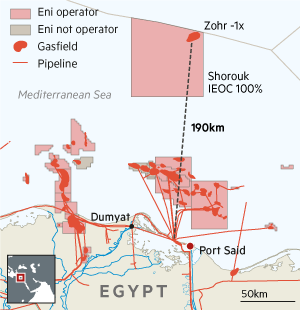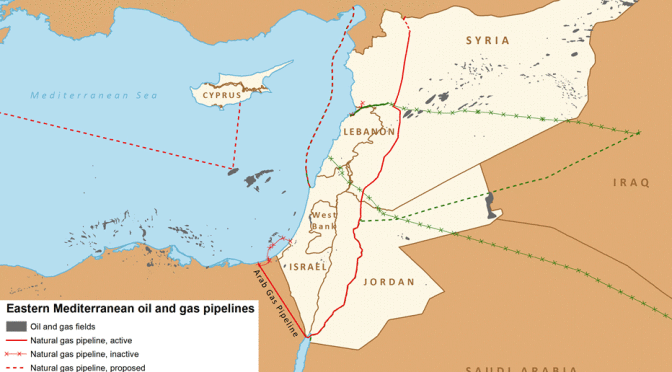The recent rapprochement between Turkey and Israel makes the geopolitical game around the Eastern Mediterranean more risky and especially its energy sector an even more cloudy sector in which Athens, Nicosia, Ankara, Israel, and Egypt want to invest and put a lot of hope already on it, but every country has a lot of obstacles and barriers to overcome in order to achieve any concrete and secure energy project.
Turkey’s New Old friends
Ever since they came to power in 2002, Recep Tayyip Erdogan and his Justice and Development Party, or AKP, have sought to tilt Turkey away from its traditional Western allies. The new Turkish policy, framed by Ahmet Davutoglu, previously the foreign minister and now serving as prime minister, was premised on the notion that Ankara could never rise as a regional power if it had good ties only with the West. He has turned out to be catastrophically wrong.
Israel-Turkey pipeline it may provide the final push to end Cyprus conflict https://t.co/AL32bSa84v #Cyprus #Cyprob pic.twitter.com/r9dZ9lRAWJ
— The Cypriot Puzzle (@Cypriot_Puzzle) 30 Décembre 2015
Mr. Davutoglu believed that by establishing better relations with countries such as Iran and Russia, and breaking occasionally with Europe, Israel and the U.S., Ankara could gain Middle East and Eurasian clout, rising as a respected regional power. Instead, the opposite has happened. Today, Turkey’s four key non-European neighbors—Russia, Iran, Iraq and Syria—are joined in a historic, newly formed axis against Ankara. Turkey’s only real ally is Washington.
Israel and Turkey are poised to re-establish diplomatic ties after years of tense relations. Top Israeli and Turkish officials met for secret talks this week in Switzerland, where they worked to complete a deal to restore relations that collapsed in 2010 after 10 people, nine Turkish citizens and one Turkish-American, were killed when Israeli commandos raided a Turkish ship carrying activists trying to break Israel’s economic blockade of the Hamas-ruled Gaza Strip.
With Turkey’s relations with Russia deteriorating, Ankara has sought to mend ties with Israel and stepped up talks with the government of Prime Minister Benjamin Netanyahu, whose country could become a vital new source of natural gas for Turkey.
Ankara also would bar a top Hamas militant from entering the country to deter him from planning attacks against Israel from Turkish soil. In addition, the two sides would launch talks over a natural gas pipeline between the two countries and resume normal diplomatic relations by sending ambassadors back to their respective capitals.
Turkey is demanding Israel allow it unrestricted access to the Hamas-controlled Gaza Strip as a condition for formally restoring diplomatic ties between the two countries, the Turkish newspaper Hurriyet Daily News reported Saturday. The report said the Turkish government, led by President Recep Tayyip Erdogan, demands free access to deliver aid to the blockaded Palestinian territory and won’t back down on the issue.
The irony for the Davutoglu-Erdogan administration is that after a decade attempting to bring Turkey closer to Russia and the Middle East, relations are back to where they were nearly 20 years ago. If Turkish-Israeli ties normalize, Turkey’s foreign policy will look almost identical to 1995, under then-President Suleyman Demirel: good ties with the U.S., bad ties with Iran, Iraq, Russia and Syria, a working relationship with the EU, and cooperation with the Iraqi Kurds who help Turkey against the PKK. It is Turkey’s moment to grasp. Ankara will be safer to turn course back to its old friends.
"They're Making Idiots Of Us!": Eastern Europe Furious At West… http://t.co/QesYYiZ0lQ #Germany #NaturalGas #Greece pic.twitter.com/PUbhiGieau
— INFORMER (@INFORMER_adm) 11 Septembre 2015
But as a deal nears, Turkey’s top regional rival, Egypt, has expressed worry to Israeli officials over Ankara’s potential reach into the region, Haaretz reported Thursday.
Egyptian officials are concerned a role for Turkey in Gaza, which borders Egypt’s restive Sinai province, could threaten its own security. While analysts said the agreement was likely to support regional peace, they also said the deal, depending on its conditions, could also be seen in Egypt as lending power to a top adversary, as well as causing security concerns by propping up Islamist forces.
But as tense as Turkey’s relations with Israel have been, ties between Egypt and Turkey have been even worse. Erdoğan, who is an Islamist, has contested Sisi’s right to rule after he toppled President Mohamed Morsi, who was aligned with the Muslim Brotherhood and whose rule led to widespread street protests. Turkey has demanded Morsi be reinstated as president, and Egypt has criticized Turkey for its support and sheltering of Muslim Brotherhood leaders, whom it considers terrorists. Egypt views any role for Turkey in Gaza as bolstering the Muslim Brotherhood, to which the ruling Islamist government in Gaza — Hamas — favors, analysts said.
Relations between Egypt and Israel, as well as shared concerns, are likely strong enough that Israel will consider Egyptian security before agreeing to any deal with Turkey.
The connection between Hamas and insurgents in Egypt’s Sinai region remains murky. Fighting picked up after the Muslim Brotherhood government was deposed, and Hamas officials, or at least members, have been accused of supporting that insurgency although Hamas too opposes those affiliated with the Islamic State group in the Sinai. Hamas has denied involvement in fighting in the Sinai.
Natural Gas Development and Exports from the Eastern Mediterranean
How will Israeli relationships with Egypt and Turkey develop? Will the reunification of Cyprus come to pass? What are the implications for natural gas production in the East-Med?
The Turkish- Israeli cooperation in the field of energy -even as a probability- confuses even more the original plans as these have been designed by Greece & Cyprus accordingly on a possible natural gas exports agreement of the huge undersea deposits of Israel and Egypt through a terminal in the south of Cyprus or in Egypt and, there by undersea pipeline to Greece , which had hoped to become a major energy supply hub of Europe with plenty of natural gas without any Russian implication. The cost of taking any pipeline to Greece from Cyprus makes this plan prohibitive.

Turkey, which depends on Russia for a sizeable portion of its oil and gas needs, may find itself obliged to bury its differences with Tel Aviv and Cairo — and possibly Greece — to make up for Russian gas in case its showdown with Moscow becomes more confrontational following the downing by Turkey of a Russian military jet on the border between Turkey and Syria.
Cyprus cannot become a natural gas hub by its own as the volume of Cypriot gas fields are lower, unfortunately, from the original estimates and the cost of construction of an LNG terminal in Cyprus and from there in Greece is just an absolutely prohibitive plan.
For Natural Gas Europe, Cyprus’s fate is not in her own hands. If the Cypriot administration is able to convince BG, Noble and Delek Group to go ahead with the development of the Aphrodite gas field without linking it to Leviathan development, and supply the gas to Egypt and to the small Cypriot market, then there is a chance that Aphrodite will be developed in the next few years. However, Cyprus has to still agree to a unitisation agreement with Israel, though it can go ahead without reaching an agreement. Cypriots also have to hope for the island’s reunification to enable gas export to Turkey.
Egypt’s leaders are probably hoping to see a rapid and successful development of their offshore natural gas fields by BP and Eni S.p.A. Eni’s development schedule of Zohr and the gas field’s full potential should become clearer during 2016. Its development is scheduled to start in January 2016. In the meantime, until its new gas fields are operational, Egypt will have to rely on relatively expensive LNG and hope that it will find the cash to pay the suppliers.
In the geopolitical sphere, Egypt became entangled with Israel, or vice versa, when an ICC tribunal awarded Israel Electric Corp (IEC) and EMG about $2 billion following the cancellation of a 20-year gas supply contract in 2012. It is still not clear whether Egypt will seek an appeal; however, it is clear that diplomats and envoys will be bothered by attempts to put out the fire that has a potential to derail export plans from Leviathan and Tamar, the Israeli gas fields.
More urgent, however, is the solution needed in order to activate the contract between the Tamar Partnership and Dolphinus Holdings. That is a small contract, 5 billion cubic metres in 7 years, at a value of $1.2 billion. Despite the contract approval by the Israeli Energy Minister, the chances of its implementation are negligible due to security issues and current Israel-Egypt relations. The pipeline that would be used, stretching from Al-Arish to the Nile Delta, would be susceptible to terror attacks, and such attacks have the potential to sour Israel-Egypt relations.
From Israel’s point of view, an improved relationship with Turkey has priority, because of its stature as the biggest economy and it has one of the biggest and strongest armies in the Middle East, in which the Israeli defense industries are showing huge interest. However, in coming closer to Turkey, Israel might encounter some resistance from Russia, an ally of Cyprus and Greece. The diplomats involved will have to call upon all their statesmanship skills in order to navigate those negotiations to a fruitful conclusion. Israel, it’s important to remember, needs Cyprus’ permission to lay a pipeline to Turkey through its Exclusive Economic Zone (EEZ) and has also to reach a unitisation agreement with the island country, another tricky obstacle to overcome.
Geopolitical conclusions.
Today Turkey has no problem , claiming that they shot down a Russian military aircraft ” because it violated its airspace for only 17 seconds ” at the very that moment when Turkey constantly violates the Greek airspace in the Aegean sea recording 2,244 violations - only in 2014!
On the other hand Israel, having suffered such a huge damage from Erdogan’s hard criticism regarding the Israeli policy in Gaza, seeks to have the best possible relations with Turkey - just like with its Arab neighbors .
Nonetheless, how this would be enough to ” trust ” an unreliable country that does not hesitate to flatten large , long-term and multifaceted relations as it did with the Russians and the Israelis themselves during the last decade?
Is it possible for Israel, Egypt and the EU, to invest billions in this “modern Turkey” as a stable and safe transporter of natural gas?
The logical answer to these questions is definitely a big NO.
For the Israeli INSS website, however, it is important that Israel not abandon the effort to repair relations with Turkey and continue to be a major player in its neighbor’s immediate environment. The effects of Turkey’s activities within Muslim populations – negative, from Israel’s perspective – are striking. There is no doubt Turkey will play a central role in shaping the future regime in Syria. Turkey is also important to Israel economically, not only because of their extensive commercial relations but also because it is a bridge for the oil flowing to Israel from central Asia and is an important potential natural gas customer. Even if the current crisis between Russia and Turkey is resolved soon, Turkey will continue to stand in Russia’s way, as it reaches for further influence in Israel’s close proximity; despite Israel’s important relationship with Russia, Israel would like to see Russia’s influence in the region curtailed. Hence another aspect of the importance of Turkish-Israeli relations: it is clearly difficult to balance the need for improving their relations on the one hand, and the need to preserve and develop relations with Greece, Cyprus, and even Egypt, which finds itself in a crisis with Turkey, though under control, on the other hand. But that is exactly the test of dynamic foreign relations, whose goal is to create the optimal strategic sphere.
Sources: WSJ.COM, ibtimes.com, New York Times, naturalgaseurope.com,

